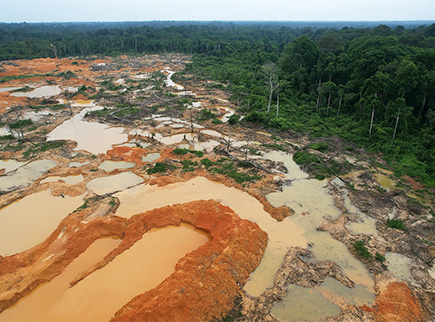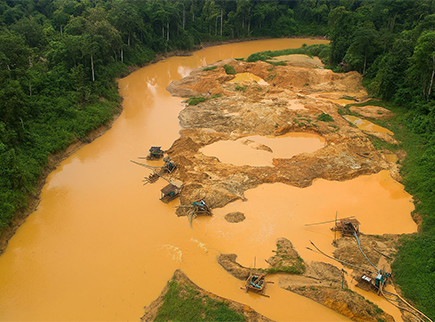As illegal mining, “galamsey,” continues to threaten Ghana’s environment and mining sector, the country faces a critical juncture in addressing this menace, a practice that has devastated ecosystems, polluted water bodies and undermined integrity of the mining sector.
Despite relentless enforcement efforts, progress remains limited without a fundamental shift in how Ghana manages and invests in its mineral resources.
Central to this transformation is strategic investment in geological surveys, an underutilized but powerful tool.
Such surveys have the potential to reshape Ghana’s mining future by turning disorder into clarity and exploitation into sustainable development.
Years of Degradation
For decades, illegal miners have operated largely in the dark, exploring lands without proper geological data and often causing environmental degradation and social unrest.
This challenge stems partly from a lack of accessible, mapped-out mineral-rich zones.
If the state does not know precisely where its resources are located, regulating mining activities becomes nearly impossible.
Impact of Geological Surveys
Geological surveys provide crucial information on the type, location, and quantity of mineral deposits across the country.
With accurate data, the Minerals Commission and other regulators can properly zone areas, allocate concessions fairly, and support small-scale miners through formalisation.
More importantly, it enables proactive regulation,monitoring operations and enforcing environmental standards with clarity and authority.
Investing in geological surveys will not only help reduce illegal mining, but also attract responsible investors, boost state revenue and protect the environment.
It is also essential for equitable resource distribution, as communities can be better integrated into legal mining schemes with transparency.
Observations by MINCOM CEO
Mr Martin Ayisi, the outgoing Chief Executive Officer of the Minerals Commission, highlighted at a training workshop for journalists the need for Ghana to invest in geological investigations and strictly adhere to designated mining block-out areas.
He stressed that this focused approach is essential for Ghana’s sustainable mining future and confirmed that the efforts have already begun.
According to Mr Ayisi, 90 percent of the solution to illegal mining lies in identifying suitable areas for miners to operate.
Determining whether an area is viable requires thorough geological investigations, which the country must prioritise, because without this, the current issues will persist.
He explained that if designated mining areas are provided, about 70 percent of the problem could be resolved, as authorities would know where miners are operating.
This, Mr Ayisi said, would allow for proper regulation, discourage the use of harmful chemicals like mercury and improve tracking of gold production, indicating this initiative has begun and represented a significant step forward.
Truth about legal mining in Ghana
Mr Ayisi believes that addressing illegal mining in Ghana is a long-term effort that cannot be achieved overnight.
While the problem is deeply rooted, several bold and strategic measures have already been implemented to combat the menace and promote responsible mining practices across the country.
He explained, “Truth be told, this is an issue that has persisted for nearly 30 years, so if I were to look you in the face and say it could be resolved overnight, I would be deceiving you,” adding that most sites have been visited and efforts are underway to properly formalise their operations.
MINCOM’s Efforts
Mr Ayisi stated, the Minerals Commission has no issues with lawful miners and has intensified regulation efforts, including collaborating closely with the Environmental Protection Agency (EPA).
He explained that many miners operating without proper licenses or approvals have been identified and steps are underway to grant them the necessary authorisation.
Indicating various initiatives, such as cooperative mining schemes, are being rolled out to formalise these miners and regulate corporate mining sites where unauthorised operations are common.
Mr Ayisi indicated that the Commission is upgrading its capacity and has sent some of its staff to top universities across the world to build strong expertise and gain knowledge in modern mining practices to support Ghana’s mining sector.
Reforms in Ghana’s Mining Sector
Mr Ayisi highlighted reforms at the heart of the amendment bill to Ghana’s 2014 mining policy and the nearly 20-year-old Minerals and Mining Act, 2006 (Act 703), including the abolition of Development Agreements (DAs).
These special agreements, which shielded companies from certain taxes and levies, will be scrapped.
According to him, they prevented the state from benefiting during record commodity booms,such as the current $3,000/oz gold price era calling the asymmetry unacceptable.
He recalled how stabilisation clauses blocked Ghana’s attempts to capture windfall profits.
He said mining leases durations will be cut from 30 years to a maximum of 15 years, reflecting the reality that most mines exhaust in under a decade, “30 years leases are excessive and out of step with economic and geological data.
Mr Ayisi said the overhaul of stabilisation clauses, broad investor protections will be abolished, though limited stability clauses may still apply to large-scale, capital-intensive projects such as refineries or major infrastructure.
He said capping prospecting Licences will help the country end indefinite licence renewals that encourage land hoarding,saying new limits, likely between 7-9 years, will align the country with global best practices.
Mr Ayisi said with mandatory Community Development Agreements (CDAs), for the first time, companies will be legally required to commit a percentage of revenue, not profit to host communities.
He illustrated this with a striking example,“If Newmont Ahafo had committed just 1 percent of last year’s $1.8 billion revenue, $18 million would have gone directly into local development.”
Mr Ayisi indicated parliamentary oversight, willalso reaffirmed Ghana’s unique stance of subjecting mining lease cancellations to parliamentary ratification, a safeguard that underscores transparency.
Government’s Position on Act 703
Alhaji Yusif Sulemana, Deputy Minister for Lands and Natural Resources, believes the time has come for Ghana to amend the Minerals and Mining Act, 2006 (Act 703) to reflect the country’s evolving mining landscape.
He said the Act was enacted years ago, and while the country has made progress, it is time to revisit the law to ensure it speaks to current realities.
Alhaji Sulemana underscored the importance of aligning legal reforms with development initiatives in mining districts.
He stated that the essence of these amendments is to ensure national ownership, saying this would ensure that all Ghanaians are part of the process so that implementation becomes seamless.

A Geoscientist’s Perspective
Professor Emmanuel Arhin, a Geoscientist, during his second professorial inaugural lecture on the topic “Myths and Realities of Artisanal Small-Scale Gold Mining (ASGM) in Ghana: The Green Gold Transition” at the University of Energy and Natural Resources said small-scale mining has evolved from using rudimentary equipment such as shovels, pickaxes, and sluice boards to semi-mechanised and mechanised operations involving excavators, bulldozers, and washing plants.
He said ASGM operators must conduct systematic geological exploration to reflect the law that granted them licenses.
This he believes, would guide operators to mine responsibly, leaving a positive legacy for future generations while safeguarding environmental integrity.
He encouraged ASGM operators to follow systematic geological methods, including scout prospecting, initial (wide-spaced) exploration, detailed (close-spaced) exploration and deposit evaluation.
Prof. Arhin believes that although some ASGMs are adopting these approaches, most are not, because the law does not require geological exploration during license acquisition.
He suggested that this could change if concession sizes were defined, allowing 10 or more operators to form a conglomerate and hire a geologist to assist in exploration and extraction planning.
Prof. Arhin also proposed the adoption of Green Gold Transitions (GGT) as a means to achieving sustainable mining operations.
He said, the GGT embraces biogeochemical methods in addition to the traditional exploration protocols for mining purposes, explaining GGT was the act of getting gold out of the ground in a “green or eco-friendly” and sustainable way without bringing hardships to the local communities.
Fulfilling SDG Requirements
According to the United Nations Sustainable Development Goal 15, which seeks to protect, restore, and promote sustainable use of terrestrial ecosystems, manage forests, combat desertification, halt land degradation, and prevent biodiversity loss terrestrial ecosystems are vital for sustaining human life, contributing to over half of global GDP and encompassing diverse cultural, spiritual and economic values.
The UN reported that between 2015 and 2019, at least 100 million hectares of healthy and productive land were degraded annually, affecting the lives of 1.3 billion people.
Global forest coverage decreased from 31.9 percent in 2000 (4.2 billion hectares) to 31.2 percent in 2020 (4.1 billion hectares).
In 2022, 21 percent of reptile species were threatened.
In 2021, Official Development Assistance (ODA) in support of biodiversity increased by 26.2 percent, from $7.7 billion in 2020 to $9.8 billion.
The UN believes that halting deforestation and restoring terrestrial ecosystems is essential to reducing the loss of natural habitats and biodiversity, which are part of our shared heritage.
CSO’s /Clergy Mount Pressure on Government
The Coalition Against Galamsey, Ghana, led by its convener Mr. Kenneth Ashigbey, has renewed its call for the government to immediately declare a state of emergency in communities affected by illegal mining activities.
At a recent press conference, the group argued that such a declaration is long overdue, emphasising that the scale of environmental devastation caused by “galamsey” far exceeds the threshold required to trigger the constitutional provision.
According to the Coalition, Article 31.9 (a) and (b) of the Constitution provides grounds for declaring a state of emergency when actions threaten essential resources.
The group stated that the current situation, where environmental criminals are depriving large communities of potable water clearly meets this criterion, which is essential to life.
Also, the Ghana Catholic Bishops’ Conference has issued a strong statement condemning illegal mining and demanding decisive action from the government.
The Bishops called on President John Dramani Mahama to declare a state of emergency, citing the country’s unprecedented environmental destruction despite record gold export revenues.
They cautioned that the continued degradation threatens the survival of millions of Ghanaians, particularly those in mining-affected regions who rely on natural water sources now rendered unsafe.
Way Forward
As Ghana reviews its mining laws and policies, prioritising geological exploration is no longer optional, however it must become a national development strategy.
A well-mapped country is a well-managed one, only by knowing what lies beneath can Ghana truly harness its mineral wealth sustainably and responsibly and safeguard it’s environment.

